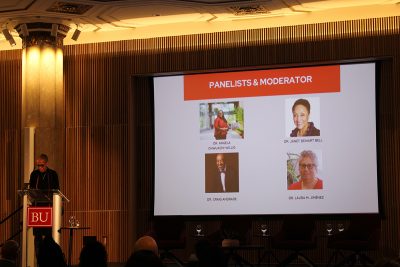By Sara Sonsini and Ava Berger
“Critical Race Theory is the language of love,” Janet Bell, panelist and social justice advocate, said during Boston University Senior Diversity Office’s Critical Race Theory panel on Feb. 10.

Between January and September of 2021, 24 states introduced or passed legislation banning CRT from schools. Amid the national debate, BU SDO, in collaboration with the Dean of Students Office, BU School of Law, Wheelock College of Education & Human Development and BU School of Public Health, held a panel on CRT in the Howard Thurman Center for Common Ground.
In addition to Bell, the event featured panelists Craig Andrade, associate dean of practice at the School of Public Health, and Laura Jiménez, associate dean of equity, diversity and inclusion at Wheelock.
“We are told to love our neighbor as ourselves, and how can you do that if you don’t respect that person’s history, that person’s past, that person’s struggles?” Bell said.
Senior Diversity Officer, Andrea Taylor, introduced the event as a “multidisciplinary panel” which would provide “context, clarity and resources” to students.
Moderator and dean of BU School of Law Angela Onwuachi-Willig emphasized the event was not a “partisan panel.”
“We’re not trying to inform you what side you should take,” Onwuachi-Willig said. “As an educational institution it’s really important that we have a responsibility to educate everybody on one of the most prominent debates that’s occurring in our country right now.”
Onwuachi-Willig started the event by defining CRT and racism. She said CRT does not “contend that a person is inherently racist.”
“It is a movement by activists, by scholars who are interested in studying and transforming the relationship between race, racism, power and the law,” Onwuachi-Willig said. “Critical Race Theory recognizes that racism is systemically embedded in laws, policies and institutions that uphold and reproduce racial inequalities.”
With regards to the law, she said CRT is a necessary alternative to the currently accepted legal doctrine of “colorblindness” which “reifies racism.”
“Critical race theory is an analytical frame that stresses that racism goes beyond individual explicit prejudice and implicit bias,” Onwuachi-Willig said. “In that sense, critical race theory primarily focuses on structural racism.”
Expanding on this definition, Jiménez challenged the common understanding that CRT focuses solely on “blackness.”
“Critical Race Theory is really about white power structures,” Jiménez said. “That’s where racism lies.”
Bell emphasized that CRT allows for “black progress” which can lead to “progress for everyone.” Yet Jiménez and Andrade both said CRT is often seen as a “boogeyman” in their respective fields.
“In education, it’s become a boogeyman,” Jiménez said. “It’s become this thing to fear and to malign and to literally burn down.”
Andrade said this fear associated with CRT allows those in power to maintain power. He spoke about why it is critical to discuss CRT.
“In the midst of this reaction … we have to make sure that we don’t allow our own communities to be bamboozled in a way that they have in the past, that we tell what Critical Race Theory is, what the history that usually isn’t told is, and how that relates to this moment in time,” Andrade said.
Bell added that by banning CRT those in power are “keeping knowledge away from their own people.”
“I always tell young people ‘Claim your space’ and ‘Claim your future,’” Bell said. “Don’t let anyone deny you the opportunity to be the beneficiary of the great knowledge that’s out there.”
In discussing how we can talk about CRT with those in opposition to the theory, Bell said “language matters.”
“Instead of saying inherent racism, structural racism is a less volatile term, even though it’s volatile, but I think that’s one way of getting into a conversation because it depersonalizes it,” Bell said.
Event attendee and graduate student in the College of Engineering, Santiago Gomez, said CRT has become a “lightning rod in the public zeitgeist.”
“Even as educated individuals we can also get lost in this meta conversation about what it is but we don’t really know how to define it,” Gomez said.
Jali Griesbach, another panel attendee and senior pursuing a dual degree in the College of Communication and the College of Arts and Sciences, described the event as “incredible.”
“I feel really empowered to just go out and continue expanding on this knowledge,” Griesbach said. “And hopefully just utilize it in conversations with people I know who feel really closed off to this kind of idea.”
Andrade said the future of the movement will continue to reject “binary frames.”
“There are people that are taking that information from traditional feminist literature, to queer literature, to liberation theory in all kinds of ways and making it their own,” Andrade said. “And that’s the future of where we’re going.”






















































































































